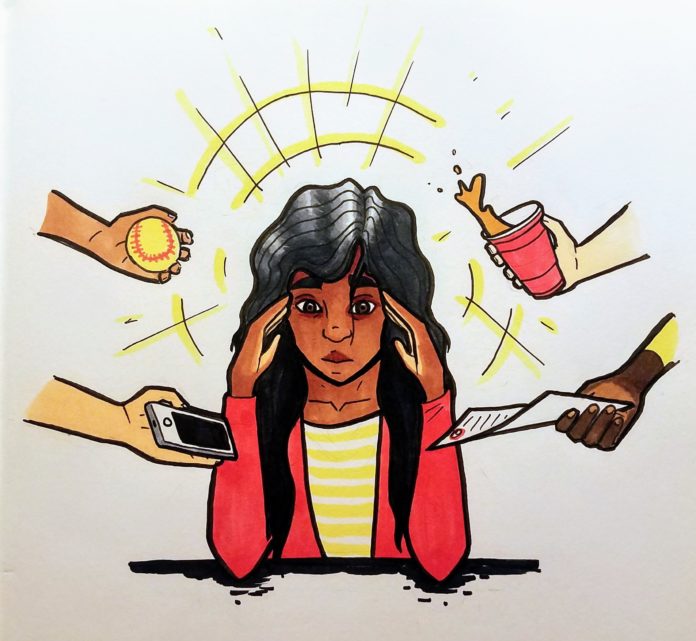Do you ever feel exhausted, unmotivated, frustrated or disengaged with your academic and personal life? If you have, you’re not alone; I’ve felt it too. There have been several occasions when I’ve gone straight from class, to a meeting with a professor, to a newspaper interview, then to Frisbee practice and finally to more homework — there never seems to be a moment to take a breath, recover and recharge. At times, I find myself dreading doing the work for activities and classes that I originally found fulfilling or exciting. Like many other students, I am burnt out from juggling the pressure of academics and my extracurriculars.
Now, the outbreak of COVID-19 has changed the way that we do schoolwork, but college students are still expected to be hardworking — despite the fact that it feels like the world is ending. It’s up to students to set their own boundaries to ensure that they are not becoming overwhelmed with these pressures. Being constantly exhausted isn’t trendy or cute, and it shouldn’t be a part of college, online or not. It’s time for us to learn how to step back, say no, and allow ourselves to relax, especially during a time like this.
Burnout, a state of exhaustion caused by continuous stress, can lead to physical and mental health problems and in extreme scenarios, death. In 2002, Kenichi Uchino, a 30-year-old man, suddenly died at work due to being overburdened and overcommitted. In the six months leading up to his death, he worked 80 hours of overtime every month. Although this is an extreme example of burnout, the condition can lead to symptoms that many college students feel, such as emotional exhaustion, depersonalization and a reduced sense of personal accomplishment. The leading factor of burnout is continuous stress — whether you’re balancing the workload of La Encina, Students for Justice in Palestine or student government the burden of managing to stay on top of it all can set students over the edge.
According to Dr. David Ballard, former head of the American Psychological Association, chronic stress is caused when people experience continuous physical or mental pressures. Though stress is healthy and can help you focus on dealing with threats or problems, it can be harmful for an extended period of time. Ballard said in a Forbes interview that “when stress becomes chronic, this narrow focus continues for a long time and we have difficulty paying attention to other things.”
I’m not here to tell you to simply “self-care!1! <3” because that seems disingenuous, like a fake fix to a real problem. But there are ways to take a step back and learn how to forge a healthy work-life balance. It’s important not to let pressures from your club leaders or professors sway you — it’s still crucial to take time to relax. Today, this de-stressing time might take different, modified forms due to COVID-19, but there are still ways in which you can relax from home. If anything, it’s even more important now to find ways to stay calm as to not exacerbate the collective stress and fear that we are all feeling.
Personally, I’ve found it really helpful to start saying no to things. By saying no, you can focus more intently on fewer things instead of spreading yourself thin and ultimately ending up with poor results, whether that be in or outside of school. When you’re always thinking about impressing both your professors and your peers, it can be easy to get caught in a pattern of constant stress — it’s up to you to take the time that you need to keep a stable work-life balance. Another thing that can be helpful, but surprisingly difficult to coordinate, is making a conscious effort to spend time with your friends in a non-academic or work setting.
It’s easier than ever to plan hangouts with the people you care about, even as you take social distancing seriously and stay at home. Instead, open Zoom to chat with friends to take your mind off both schoolwork and the current situation. Recently, I was stressed about finishing my research paper proposal in time and was thinking about my family’s safety, so I talked with my friends for about an hour on Zoom and put my mind off both my schoolwork and the coronavirus. After my break, I felt more stable and was ready to tackle my assignment. I could have finished my proposal earlier if I didn’t talk to my friends, but it was necessary to take the time to de-stress and avoid getting overwhelmed.
Due to the outbreak, relaxation might take a new form than students are not generally used to, like leaving the house (still social distancing, of course), or getting alone time to unwind before you can tackle your school and extracurriculars. Stress relief can also look like taking a break from the constant news cycle in order to not get freaked out about the state of the world. Though you’re now at home, schoolwork anxiety can still creep into your life and affect you negatively, especially added on top of the fear created by COVID-19. Stay calm and remember that schoolwork stress isn’t that important in the grand scheme of things.
Oona Milliken is a sophomore Comparative Studies in Literature and Culture (CSLC) major. She can be reached at omilliken@oxy.edu.
![]()































